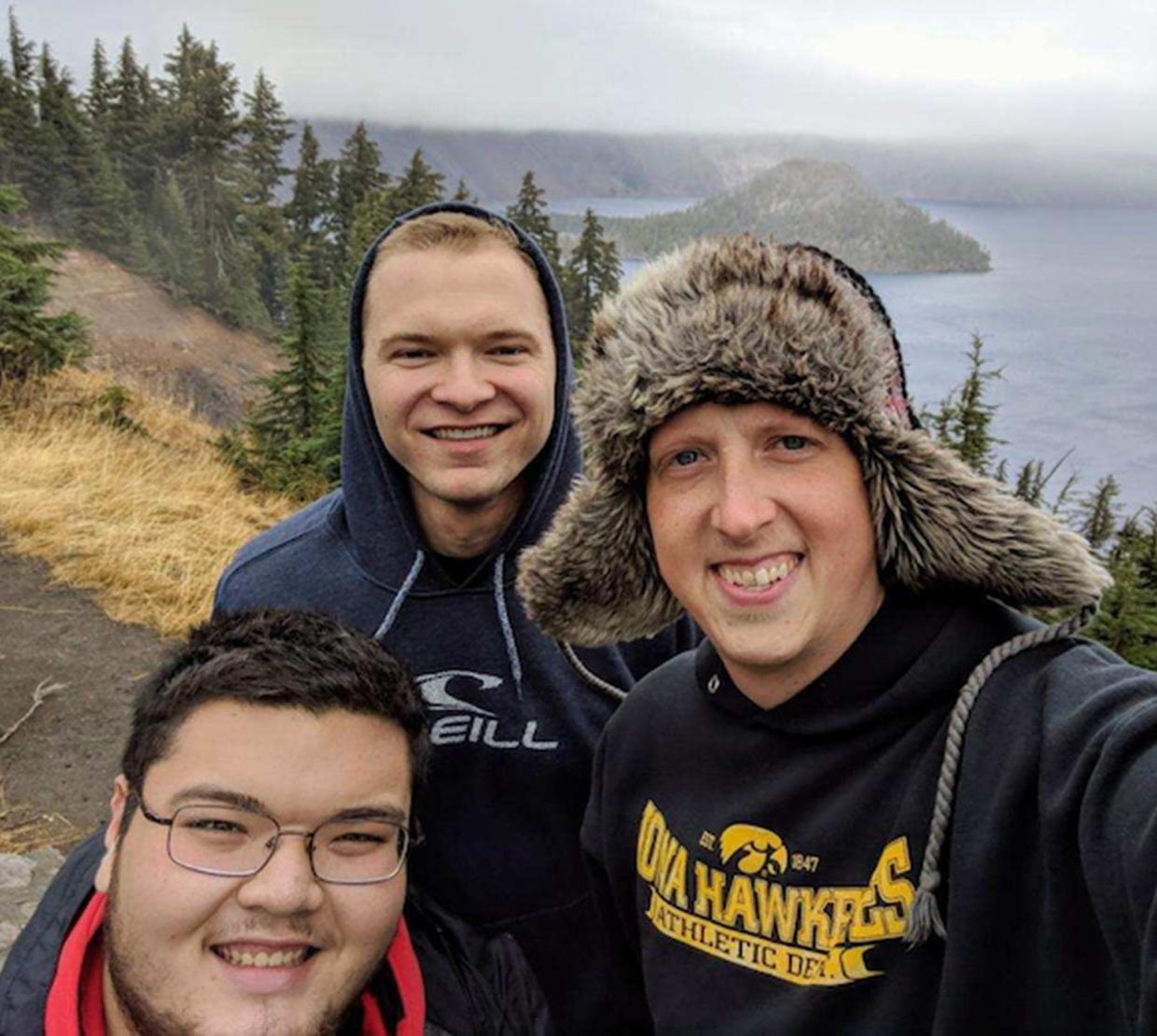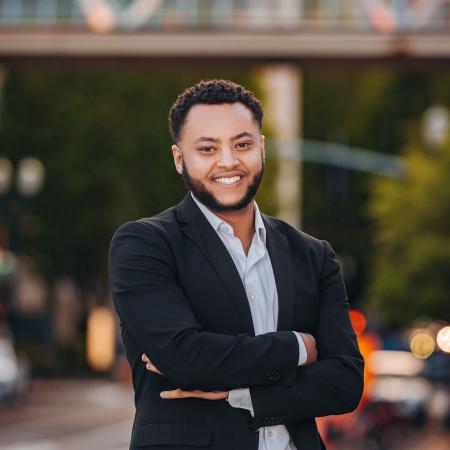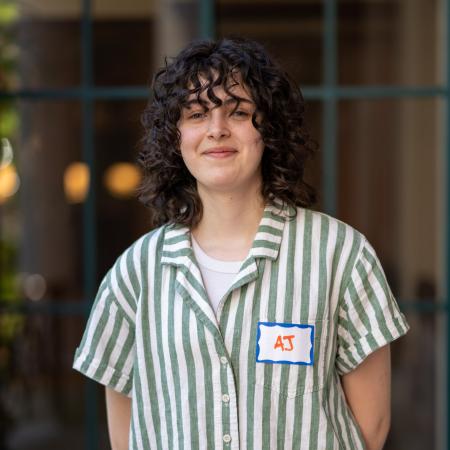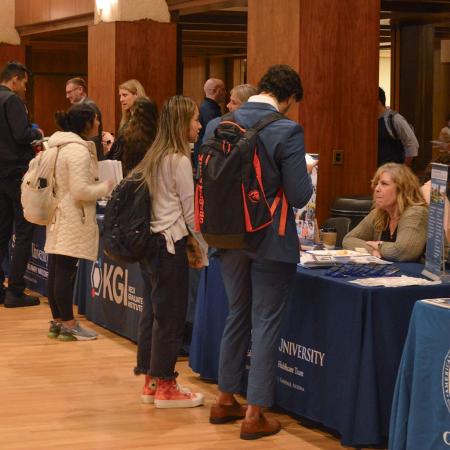“It’s a dream every day being here,” says biochemistry and molecular biology (BMB) senior Cooper Lee Stateler, a first-generation college student who grew up near Coos Bay, Oregon. He was one of only 30 in his high-school graduating class. Cooper (pictured top, left with friends) set his sights on college early on, when elementary school teachers noticed his potential and encouraged him to pursue higher education despite some family struggles. “I was definitely raised by the village.”
Inspired by his teachers as well as his dad, who worked overtime at the local plywood mill and imbued him with a strong work ethic, Cooper studied hard and won a Ford Family Foundation Scholarship. The program assists students who would find it otherwise impossible or very difficult to go to college, supporting up to 90 percent of the unmet cost. So Cooper unexpectedly had the financial means to go anywhere.
He chose Oregon State University. Why? A campus tour guide mentioned that the medical school admittance rate at the College of Science was much higher than the national average, and, as an aspiring pre-med, Cooper was sold. “If I could do well here, I could go anywhere. It was a no-brainer.”
Coming from such a tiny high school, Cooper found Oregon State overwhelming at first. “Walking into a class with 350-400 people inside and another 300 waiting to get in took some getting used to. But I learned how to adapt and thrive.”
A general science major when he began, Cooper switched to biochemistry and molecular biology when his advisor encouraged him to pick out something more specific that he was passionate about. The BMB major jumped out at him; he had loved his anatomy and physiology class and understanding how the human body works at the molecular level seemed like a solid foundation for medical school. He didn’t realize at the time the challenge he had taken on.
“If I could do well here, I could go anywhere. It was a no-brainer.”
“They will be the first to admit this,” said Cooper, referring to the Department of Biochemistry and Biophysics. “They hold us to a very high standard in terms of the depth and breadth of knowledge. We have to take advanced versions of organic chemistry and biochemistry, and when you compare what we have to master for the midterm compared to what regular classes cover, it’s way more material, and it’s harder to get the ‘A’!”
In addition to his classes, Cooper enjoyed his research in Tory Hagen’s Lab, working on human clinical trials to test the validity of vitamins for the elderly. Cooper’s role was to spin down blood samples, separate the layers, pull out the monocytes and prepare them to be analyzed. The work became routine, but the time spent elbow-to-elbow with Hagen did not.
“I think the world of him,” said Cooper. “He’s very pro student success and you can feel it; you don’t have to wonder whether he is sincere. He is resilient and,” Cooper grinned, “extremely smart.”
Cooper took on other challenges, too. Thanks to an OSU friend who went to optometry school and recommended it as a great career path, he did a job shadow with a Corvallis optometrist and loved it. He then faced a difficult crossroads when he got a choice part-time job as a medical scribe, “a job I had always wanted.” In a busy family medicine practice, the job was fast-paced and involved a “steep learning curve” as Cooper bounced between three or four doctors, each of whom had their own unique note-taking system they expected him to master. He wanted to spend time outside of work studying to get better at the job, but as a full-time student, knew that his grades would suffer as a result.
“I had to sit down and say, ‘What are my priorities?’ I realized I had to let it go.”
Cooper did find time to participate in other activities, however. He volunteered for TRIO Student Support Services, as a way to give back and help other students from at-risk populations who, like himself, were trying to beat the odds. Once a week he met one-on-one with these students to teach them how to study, what to focus on, and how to maintain good study habits. He also loved starting his mornings with exercise and his favorite sport, basketball, taking the recreational class with Coach Tyler several times and also playing on OSU’s intramural basketball league. “It was great for stress relief, said Cooper.
As it turned out, one highlight of Cooper’s senior year was serving as a scout for the Oregon State women’s basketball program. “I got to admire and personally get to know everything that went into our top national-level program, helping prepare our Beavers for their league games. It was a tremendous part of my experience here!”
Stress relief from basketball was welcome, especially during his senior project, a protein study under the guidance of Ryan Mehl and Kari van Zee that “was the hardest thing I’ve ever done.” Cooper was “devastated” when he turned in his first draft and got a C. He went to Mehl’s office hours and gradually learned that in order to write like a scientist, he had to learn what was almost a whole new language and explain himself in a detailed and concise manner.
“It was tough but I loved how Mehl didn’t ever lower his standards.” After much rewriting and many late nights, Cooper turned in a revised paper and was ecstatic not only with his grade (an A) but also with the knowledge that he’d “made something new,” a small but real contribution to science.
Cooper was grateful for OSU’s high standards when he took the Optometry Admission Test (OAT), and scored in the 95thpercentile. “The inorganic chemistry part of the test, said to be really hard, felt relatively simple thanks to the BMB work I did. The hard work paid off.”
Although Cooper already has an acceptance to Pacific University’s Optometry School in his pocket, he is still drawn to his original dream of medical school. But first, he’s looking forward to a relatively relaxing summer after graduation.



